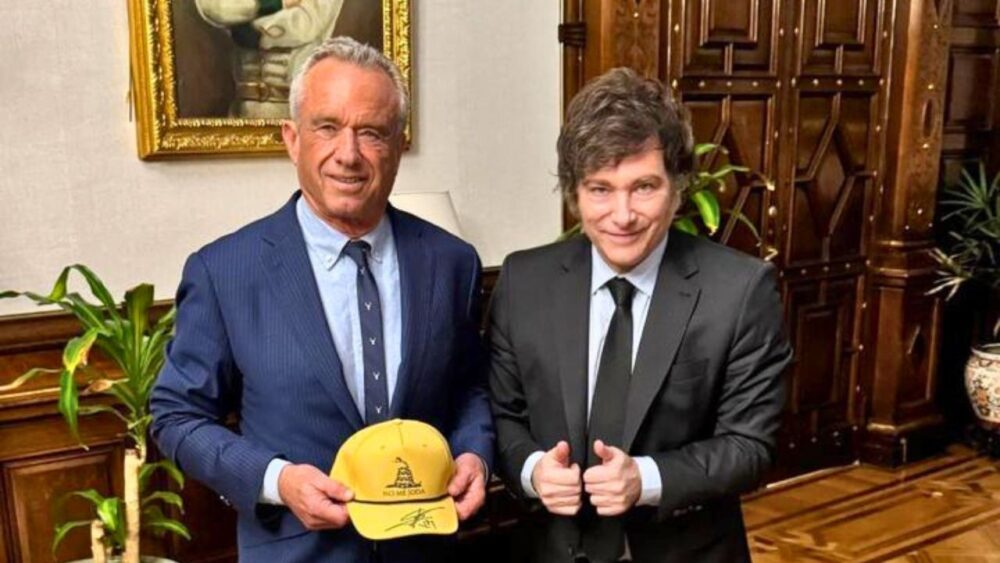Argentina has formally withdrawn from the World Health Organization, deepening a growing rift between Western populists and the U.N.’s leading global health agency.
The ratification of Argentina’s withdrawal was confirmed Monday during the U.S. Health Secretary Robert F. Kennedy Jr.’s visit to Buenos Aires. This action follows a February announcement by President Javier Milei, echoing the re-election campaign promises of President Donald J. Trump, who reentered the White House in January and immediately reinstated plans to withdraw the U.S. from the WHO.
“The WHO’s prescriptions do not work because they are not based on science but on political interests and bureaucratic structures,” Milei’s government said in a statement on May 26, as reported by The Guardian.
Kennedy now says that both governments aim to construct a new international health architecture, grounded in what they call “gold-standard science” and national sovereignty.
I had a wonderful meeting with Argentine President @JMilei about our nations’ mutual withdrawal from the WHO and the creation of an alternative international health system based on gold-standard science and free from totalitarian impulses, corruption, and political control. pic.twitter.com/08VLQgxrgK
— Secretary Kennedy (@SecKennedy) May 27, 2025
A Joint Vision
In a joint statement released on May 27 by the U.S. Department of Health and Human Services and Argentina’s Ministry of Health, Kennedy and his Argentine counterpart, Mario Lugones, said the WHO had “failed to provide critical access to information” and accused it of allowing political agendas to compromise scientific judgment.
“Our shared commitment is to cost-effective, evidence-based public health interventions,” the statement read, adding that the WHO’s structure is “increasingly reliant on voluntary contributions and vulnerable to the influence of non-scientific agendas.”
Echoes of Trump’s First Term
Argentina’s move and Kennedy’s rhetoric mirror former President Trump’s first break with the WHO in April 2020. At that time, Trump suspended funding and accused the agency of “severely mismanaging and covering up the spread of the coronavirus,” particularly its early reluctance to support travel bans from China, Politico reported.
The United States was the WHO’s largest donor at the time, reportedly providing over $400 million annually. The funding halt was met with fierce backlash from some in the medical community and Democratic lawmakers. Then-AMA President Patrice Harris warned the decision would undercut global efforts to combat the pandemic, while House Speaker Nancy Pelosi called it an “act of true senselessness.”
Though President Joe Biden restored WHO membership after taking office in 2021, Trump’s second administration reversed that decision within hours of inauguration in January 2025. An executive order posted to the White House website on January 20 stated the WHO “continues to demand unfairly onerous payments from the United States” and “fails to demonstrate independence from inappropriate political influence.”
The order also called for the reassignment of U.S. personnel working with the WHO and pledged a review of all agreements related to the WHO’s proposed Pandemic Accord and International Health Regulations.
A Divided West, a Shifting Landscape
Kennedy, who addressed the WHO’s World Health Assembly via video last week, urged more countries to exit the agency, alleging undue influence from China, gender ideology, and the pharmaceutical industry, per The Guardian.
Skepticism of the WHO has been growing in the United States since the height of the COVID-19 pandemic, when the organization supported school closures in places like Iran, despite the relative lack of risk COVID posed to children.
In his May 20 video post, Kennedy said the WHO has become “mired in bureaucratic bloat, entrenched paradigms, conflicts of interest, and international power politics,” and that its failures during COVID should serve as a wake-up call.
Public support for WHO reform or withdrawal has found new allies, including activists like Diane Cotter, who thanked Kennedy in a reply on X, writing: “We saw this firsthand when leading PFAS scientists discovered WHO was influenced by the cancer club… I await our turn at bat to expose the firefighter serial killer.” Cotter has campaigned against PFAS chemicals in firefighting gear, a cause Kennedy has previously supported.
Dr. Mary Talley Bowden, a Houston-based ENT who made headlines for opposing COVID-19 vaccine mandates, responded to Kennedy’s May 20 post with a series of clapping hand emojis.
Global Health in Flux
Argentina’s health minister, Lugones, echoed Kennedy’s call for a fresh start, saying the two nations would “strengthen transparency and trust in the health system” through bilateral cooperation.
Both nations now aim to rally others behind their cause. “[We]… invite all nations committed to scientific integrity, transparency, and the defense of human dignity to join us in shaping a new era of global health cooperation,” their joint statement declared.


